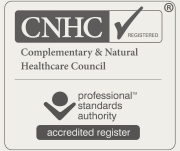ECZEMA
Eczema is a skin disorder that causes symptoms like inflammation, redness, dryness, weeping, crusting and scaling.

It can often be very itchy and with constant scratching the skin can change in appearance. With eczema the protective barrier of the skin is compromised, often due to a loss of moisture, less protective fats and oils so the cells of the skin are not as protective as they should be. This means that bacteria or chemicals can get in between the gaps and cause irritation. There are many types of eczema;
Atopic eczema – can be all over the body but is typically on the backs of knees and inside elbows. It is often genetic with other members of the family also having symptoms, encouraged by environmental triggers such as pet fur, pollen or dust mites. When these environmental allergens meet the compromised skin barrier then inflammation can occur and the symptoms of redness and itching follow.
Contact dermatitis – this is where there is a direct irritant to the skin such as a chemical in a soap, perfume in a lotion, metal in jewellery or particular food. Symptoms are always on the surface of the skin that comes into contact with the irritant.
Seborrheic dermatitis – this includes dandruff and often in areas where there are a lot of oil glands and manifests as flaky skin that can then become red, itchy and inflamed. It can look greasy but also sheds dry flakes of skin and can look crusted in places. It has been linked to yeasts and bacteria.
Symptoms of eczema:
- Inflammation – skin is red and swollen
- Itchy – scratching can make it worse ‘itch scratch cycle’
- Crusty skin – which can crack and ooze.
- Peeling skin or flaking skin – making the skin feel very dry. Dandruff is a form of this.
- Cuts and cracks on the skin.
- Changes in the texture and colour of the skin
- Sensitivity to chemicals in personal body products
What causes eczema?
- Genetics – that affect the quality of the skin
- Less oil in the skin – either due to genetic reasons or immune system changes that can cause inflammation due to bacteria or yeasts.
- Allergies – to foods, chemicals or perfumes.
Conventional Approach
- Steroid creams to reduce inflammation to reduce the redness, swelling and itchiness.
- Creams that add more moisture to the skin.
Things you can do:
- Try an elimination diet – foods like gluten and dairy can aggravate eczema as can preservatives, shellfish, peanuts and sugar.
- Eat more Omega 3 essential fats – oily fish (salmon, mackerel, anchovies, herring, sardines), walnuts, flaxseeds, chia seeds, eggs.
- Avoiding environmental allergens – choose organic personal care products that are free from perfumes. Get an air filter to filter dust, pollen, pet hair.
- Try a probiotic supplement – to improve the gut immune system.
- Check your vitamin D – very often deficient with eczema.
What can Functional Medicine do to support?
- Use functional testing to identify any allergies or intolerances that could be triggering symptoms.
- Personalised elimination diet to identify food triggers whilst advising on what to include in the diet.
- Lifestyle suggestions on skin treatments and stress reduction.
- Functional testing to understand which is happening in the gut as digestive imbalances (yeast overgrowth and bacteria) can often trigger eczema and also add to inflammatory load in the body.
- Using diet and supplements to reduce inflammation in the body.
5 Pillars of Functional Medicine

Managing Stress
Chronic stress can lead to an increased risk for many diseases through
suppression of the immune system. Lets find ways to manage stress and to
nurture, to calm, to re-set and restore the immune and nervous system.

Sleep
Sleep is the first like of defence against infectious disease. Getting good quality
sleep is restorative and preventative. We’ll work together to ensure you have
a good sleep routine and get a least 7 – 9hrs restful sleep a night.

Nutrition
Food is our medicine; it tells us what genes to switch on or off, it gives the cells
the nutrients that the body needs to function and provides the energy that we
need to lead an enriched life. Here, we’re all about enjoying food for life.

Relationships
Toxicity is not just about chemicals and pesticides; toxicity can come from
relationships and can affect our physical and mental health and well-being.
We’re all for healthy relationships that help us to thrive and grow as human beings.

Exercise
Lack of exercise is the primary cause of most chronic diseases and also accelerates ageing.
Exercising can prevent or delay the onset of chronic disease and it supports
better sleep, assists in weight control, improves mood and boosts energy.
Eczema and Functional Medicine
Do you suffer from eczema and have tried all the usual approaches?
Functional Medicine can help you, simply book an online consultation or arrange a free 15 minute discovery call and find out how we can help.





